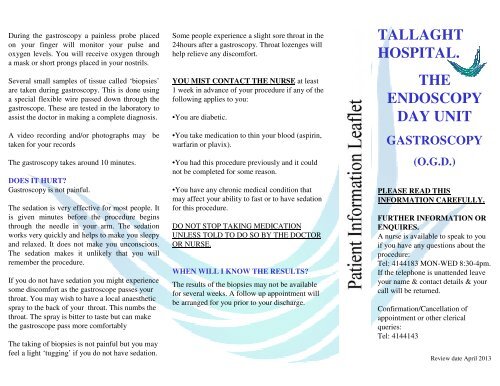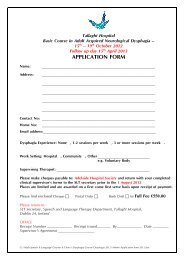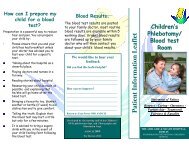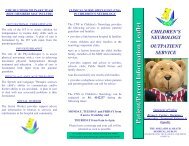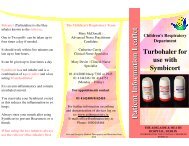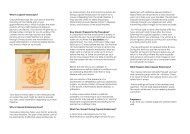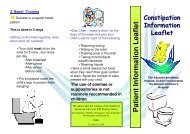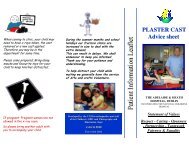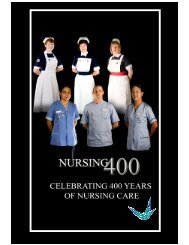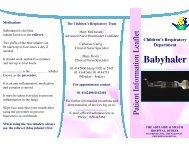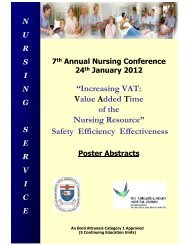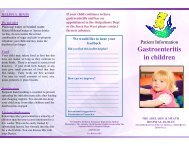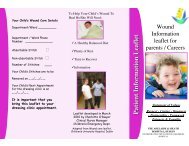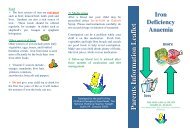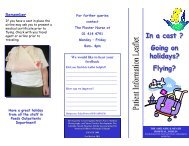What is a gastroscopy?
What is a gastroscopy?
What is a gastroscopy?
You also want an ePaper? Increase the reach of your titles
YUMPU automatically turns print PDFs into web optimized ePapers that Google loves.
During the <strong>gastroscopy</strong> a painless probe placed<br />
on your finger will monitor your pulse and<br />
oxygen levels. You will receive oxygen through<br />
a mask or short prongs placed in your nostrils.<br />
Several small samples of t<strong>is</strong>sue called ‘biopsies’<br />
are taken during <strong>gastroscopy</strong>. Th<strong>is</strong> <strong>is</strong> done using<br />
a special flexible wire passed down through the<br />
gastroscope. These are tested in the laboratory to<br />
ass<strong>is</strong>t the doctor in making a complete diagnos<strong>is</strong>.<br />
A video recording and/or photographs may be<br />
taken for your records<br />
The <strong>gastroscopy</strong> takes around 10 minutes.<br />
DOES IT HURT?<br />
Gastroscopy <strong>is</strong> not painful.<br />
The sedation <strong>is</strong> very effective for most people. It<br />
<strong>is</strong> given minutes before the procedure begins<br />
through the needle in your arm. The sedation<br />
works very quickly and helps to make you sleepy<br />
and relaxed. It does not make you unconscious.<br />
The sedation makes it unlikely that you will<br />
remember the procedure.<br />
If you do not have sedation you might experience<br />
some d<strong>is</strong>comfort as the gastroscope passes your<br />
throat. You may w<strong>is</strong>h to have a local anaesthetic<br />
spray to the back of your throat. Th<strong>is</strong> numbs the<br />
throat. The spray <strong>is</strong> bitter to taste but can make<br />
the gastroscope pass more comfortably<br />
The taking of biopsies <strong>is</strong> not painful but you may<br />
feel a light ‘tugging’ if you do not have sedation.<br />
Some people experience a slight sore throat in the<br />
24hours after a <strong>gastroscopy</strong>. Throat lozenges will<br />
help relieve any d<strong>is</strong>comfort.<br />
YOU MIST CONTACT THE NURSE at least<br />
1 week in advance of your procedure if any of the<br />
following applies to you:<br />
•You are diabetic.<br />
•You take medication to thin your blood (aspirin,<br />
warfarin or plavix).<br />
•You had th<strong>is</strong> procedure previously and it could<br />
not be completed for some reason.<br />
•You have any chronic medical condition that<br />
may affect your ability to fast or to have sedation<br />
for th<strong>is</strong> procedure.<br />
DO NOT STOP TAKING MEDICATION<br />
UNLESS TOLD TO DO SO BY THE DOCTOR<br />
OR NURSE.<br />
WHEN WILL I KNOW THE RESULTS?<br />
The results of the biopsies may not be available<br />
for several weeks. A follow up appointment will<br />
be arranged for you prior to your d<strong>is</strong>charge.<br />
TALLAGHT<br />
HOSPITAL.<br />
THE<br />
ENDOSCOPY<br />
DAY UNIT<br />
GASTROSCOPY<br />
(O.G.D.)<br />
PLEASE READ THIS<br />
INFORMATION CAREFULLY.<br />
FURTHER INFORMATION OR<br />
ENQUIRES.<br />
A nurse <strong>is</strong> available to speak to you<br />
if you have any questions about the<br />
procedure:<br />
Tel: 4144183 MON-WED 8:30-4pm.<br />
If the telephone <strong>is</strong> unattended leave<br />
your name & contact details & your<br />
call will be returned.<br />
Confirmation/Cancellation of<br />
appointment or other clerical<br />
queries:<br />
Tel: 4144143<br />
Review date April 2013
WHAT IS A GASTROSCOPY?<br />
A <strong>gastroscopy</strong> allows the doctor to look directly<br />
inside the upper gastrointestinal tract. The upper<br />
gastrointestinal tract refers to the oesophagus<br />
(gullet), the stomach and the duodenum (part of<br />
the small bowel connected to the stomach).<br />
The doctor guides a slim, flexible tube<br />
(gastroscope) over the tongue and down the<br />
oesophagus into the stomach and duodenum. A<br />
tiny camera at the tip of the gastroscope relays<br />
pictures back onto a telev<strong>is</strong>ion screen.<br />
Gastroscopy may be safely performed without<br />
sedation but intravenous sedation can be given if<br />
you prefer. It does not require a general<br />
anaesthetic.<br />
If you do not have sedation you can be<br />
d<strong>is</strong>charged after the procedure and<br />
continue your daily activities. If you have<br />
sedation you stay in the Endoscopy Unit until you<br />
are fully awake and ready to be collected.<br />
ALL PATIENTS RECEIVING SEDATION<br />
MUST HAVE SOMEONE TO DRIVE THEM<br />
HOME FROM THE HOSPITAL. SOMEONE<br />
SHOULD STAY WITH THEM OVERNIGHT.<br />
WHY DO I NEED A GASTROSCOPY?<br />
A <strong>gastroscopy</strong> <strong>is</strong> a way of looking directly for<br />
causes of stomach or gullet problems including<br />
indigestion, heartburn, vomiting, melena (passing<br />
black motions) or difficulty swallowing. It can<br />
also help your doctor make a diagnos<strong>is</strong> when<br />
someone has lost a lot of weight quickly or has a<br />
low blood count(anaemia) with no obvious cause.<br />
WHAT ARE THE RISKS?<br />
All medical procedures carry a r<strong>is</strong>k of<br />
complications.<br />
There <strong>is</strong> a small r<strong>is</strong>k of damage to teeth or<br />
bridgework. Serious r<strong>is</strong>ks are, severe bleeding<br />
(although bleeding from biopsy sites <strong>is</strong> usually<br />
minimal and stops quickly) and a perforation<br />
(tear) in the stomach or gullet. Serious<br />
complications would require a hospital adm<strong>is</strong>sion<br />
and perhaps surgery.<br />
Sedation can effect breathing, heart rate and blood<br />
pressure but close monitoring allows<br />
problems to be seen and treated quickly. Drugs<br />
are available to reverse the effects of the<br />
sedative.<br />
Serious complications are very rare.<br />
We make you aware of them so that you have<br />
all the information you need when deciding if<br />
you w<strong>is</strong>h to have a <strong>gastroscopy</strong> done or not.<br />
HOW DO I PREPARE FOR<br />
GASTROSCOPY?<br />
You must fast from food and fluids from<br />
midnight on the day before your procedure.<br />
WHAT HAPPENS ON THE DAY OF MY<br />
GASTROSCOPY?<br />
A doctor will talk with you about the<br />
procedure and the r<strong>is</strong>ks. He/she will ask you to<br />
sign a consent form. Your consent confirms<br />
that you understand the procedure and r<strong>is</strong>ks.<br />
If you require sedation the doctor will insert a<br />
small needle into a vein in your arm through<br />
which the sedation will be given.<br />
You will be asked to lie on a trolley bed, on<br />
your left side with your knees drawn up<br />
towards your chest. A nurse will ask you to<br />
hold a small doughnut shaped plastic<br />
‘mouthguard’ in your mouth. Th<strong>is</strong> protects<br />
your teeth and gums and allows the doctor to<br />
pass the gastroscope easily.


